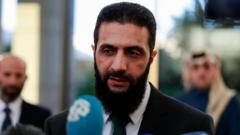In a shifting Syria, members of minorities like the Alawites, Christians, and Druze are grappling with fears of reprisal, changing allegiances, and the urgent need for security. While groups such as Hayat Tahrir al-Sham (HTS) assert plans to protect these communities, apprehensions linger over future governance and societal stability.
Syrian Minorities Navigate Uncertainty Amidst Political Change

Syrian Minorities Navigate Uncertainty Amidst Political Change
As Syria undergoes significant political transformations, minorities confront insecurity and the potential for reprisal while expressing diverse aspirations for the future.
Driving into Mezzeh 86, a working-class neighborhood in the west of Damascus, we are waved through a checkpoint manned by fighters from Hayat Tahrir al-Sham (HTS). Buildings are rundown and in need of repairs. This area is dominated by members of Bashar al-Assad's Alawite sect, an offshoot of Shia Islam whose followers constitute one of Syria's largest religious minorities. For over 50 years, the Alawites held significant power in this predominantly Sunni Muslim nation, but with the recent overthrow of Assad's regime, many from this community now fear potential reprisals from the ruling Sunni factions.
Alawites, who previously thrived in various governmental roles under Assad, are increasingly concerned about the consequences they may face. Numerous Alawites we contacted via phone opted not to engage, expressing fear of speaking. Yet, in Mezzeh 86, there was a noticeable presence of Alawites willing to share their stories, seeking to distance themselves from the former regime.
“During the Assad regime, people believed we were wealthy and got all the opportunities, but in reality, most Alawites are struggling. Only the Assad family became rich," stated Mohammad Shaheen, a local pharmacy student. Fellow community member Hasan Dawood affirmed that many were considered subservient, functioning as drivers and servants for the regime.
Feelings of betrayal linger, especially among Alawites who felt abandoned by Assad’s abrupt departure. “He should have at the very least addressed the public. Instead, he vanished without explanation, which created chaos,” lamented Mohammad.
While some former military personnel fear vengeance for past actions, those without direct blood on their hands feel less threatened by HTS. Reports of retaliation have emerged in other parts of Syria, but so far, there is no concrete evidence indicating HTS's involvement. Alawites in the region currently note a cautious but respectful rapport with HTS, although there are still concerns over factions posing as HTS to instill fear.
As HTS takes hold of Damascus, they have professed a commitment to accountability for those involved in torture and violence during Assad's reign, though clarity on how this will unfold remains ambiguous. HTS also assures that rights and freedoms of minorities will be respected, though many question the implications of their Islamist nature on Syria's diverse cultural fabric.
“We don’t want Syria to become another Afghanistan," expressed Youssef Sabbagh, a Christian lawyer, reflecting widespread concerns. While many citizens celebrate the fall of the dictatorship, they also crave a future devoid of lawlessness or civil strife.
Christian communities, historically significant in Syria, hold a cautious sense of optimism. Meetings between church leaders and HTS have concluded peacefully so far, and signs of normalcy persist in the Christian quarters of Old Damascus. Lawyer Ouday al-Khayat observed the mix of hope and anxiety; while HTS has shown promising indications so far, the watchful stance indicates lingering fears of potential upheaval.
Further south in the city of Suweida, where the Druze majority resides, there is a notable political awareness and sentiment of defiance against the regime. Following months of protests that preceded Assad's downfall, Druze activists like Wajiha al-Hajjar assert their readiness to claim rights and advocate for equality.
As these communities navigate the complexities of Syria's political landscape, the future remains uncertain, characterized by apprehension, hope, and a shared desire for a more inclusive and stable society. Additional reporting contributed by Aamir Peerzada, Leen Al-Saadi, and Sanjay Ganguly.



















